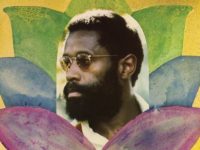The Headhunters, who with Herbie Hancock crafted jazz music’s first platinum release, return this month with an aptly titled new project — Platinum. In 2003, their million-selling 1973 debut Head Hunters was ranked No. 498 in Rolling Stone’s list of the 500 greatest albums of all time. Led by longtime drummer Mike Clark and percussionist Bill Summers, the Headhunters had later stand-alone success after Hancock’s departure — producing the dance anthem “God Make Me Funky,” one of the most sampled fusion songs in history.
On June 14, 2011, they’ll release Platinum in conjunction with Owl Studios. The layered, genre-busting project includes original saxophonist Bennie Maupin, as well as current Headhunters reedman Donald Harrison, keyboardist Patrice Rushen, P-Funk founder George Clinton, trumpeter Derrick Gardner and guests Snoop Dogg and Jaecyn Bayne, among others.
Summers took a moment recently for a Something Else! Sitdown, sharing his thoughts on the new album, his rejuvenated collaboration with Irvin Mayfield, plans for a major arts facility in his adopted home of New Orleans and some of those classic Headhunters sides …
NICK DeRISO: Head Hunters, the first jazz record to go platinum, was at the forefront of a heady new concoction in the early 1970s that brought in elements of rock, Afro-Cuban, and Latin music. Were you surprised when some people questioned, back then, whether it was jazz at all?
BILL SUMMERS: It didn’t bother me, because the people who were criticizing and questioning it were people who didn’t know much themselves. What do they know? They can criticize, but they are not a part of that movement. Who wants to stand still, anyway? A lot of musicians get caught up in their age. They play music and are popular and they get stuck in that decade — and then in 2011, they are still in 1970, wearing the same clothes and hairstyle. Some of us choose to move forward. It did what it did, regardless of what they said. There is some serious jazz in there.
NICK DeRISO: What’s always been so interesting about the Headhunters records, going all the way back, was the way the percussion and rhythm elements move in and around the beat. They’re complex, but never busy. How do you do that?
BILL SUMMERS: It’s kind of simple, and then again it’s not. What I’ve done, I learned all this traditional music, all of these different sounds. There are drums that have skin on them, metal instruments like bells, then you have wood instruments like blocks, and you have shakers. As you study the music, there is a form that goes there. Bells and shakers play a fixed rhythm. The African concept was the most important influence. Funk, call and response, that’s distinctly African — not European. When you look at the percussion aspect, it’s already been established over the thousands of years how to deal with it. Then you have some support drums, like the toms. It’s not played all the time, but appears going into and out of sections. Then you have the high hat, very much like a shaker. It has a pattern, and it’s constant. Next is the kick drum, and that plays another pattern. It’s the West African ensemble concept; that’s how I put it together. We create an ensemble for the verse, and for the chorus, playing the same instruments. Then you add different textures. You have to be careful that it never gets in the way. You create a pattern, then you make it fit. A lot of it is based on the feeling of the track.
NICK DeRISO: A similar one-world aesthetic plays out today through your founding of the Summers Multi-Ethnic Institute of Art in New Orleans. What’s your mission there?
BILL SUMMERS: I hope to build an arts city. That’s my goal — a large arts facility that represents six different continents. I’ve been working on it for 30-something years; it’s one of my lifelong goals. We’re getting there, little by little. We hope to simulate every continent physically on a large plot of land. Each area of the planet will have its own section. The focus would be on art, every aspect of it. Can you imagine what it would be like to be in a place like that, walking in a big circle through all of the different cultures? The concept is in a circle, like the planet. In the middle, I envision something called “Q World,” named after Quincy Jones — something like Times Square and Broadway. Everything comes together in the middle. It’s a pretty ambitious project, but somebody built the pyramids so I guess I can do it.
NICK DeRISO: I am continually amazed by the complexity of your collaborations with Irvin Mayfield in Los Hombres Calientes, which really focused on the Latin tinge in your playing. I know you guys reunited this year for Jazz Fest; are there other plans to play?
BILL SUMMERS: We’re hoping to sign a new recording contact this summer. That’s in the works; me and Mr. Mayfield are definitely back on track. But it’s Afro-Cuban, more from the roots of the African diaspora, than it is Latin. The Cuban drums, conga and bongo, those were created directly because of the slave trade. New instruments were derived from necessity; they used barrels or what have you. These drums are now famous all over the world, as are the dances that accompanied those songs. The mistake is calling it Spanish, or Latin. It’s African. We talk about that in the shows. People are familiar with this stuff, but they don’t know what it means. Because of its connection to slavery, to call it Latin, it’s like sabotage. Some don’t want to give credit where it’s due. It’s a kind of cultural vampirism.
NICK DeRISO: When you restarted the Headhunters in 2001, you continued to mix old and new names, adding former Art Blakey sideman Donald Harrison. What brought you to the talented New Orleans saxist?
BILL SUMMERS: Donald knows all of these different kinds of music. He also played with Eddie Palmieri, if you want to talk about so-called Latin music. He has the chops, all of this history — and all of this talent. He’s replaced Bennie Maupinin the band, and I don’t think it’s been any problem for Donald. He’s a pretty complete guy.
NICK DeRISO: The new album from the Headhunters is a free-ranging effort, incorporating everything from the expected funk workouts to some surprising guest turns from artists in the rap genre. Was the intent to show how your core sound has resonated with a new generation?
BILL SUMMERS: To set the record straight, in the rap industry from the beginning, people sampled the Headhunters. We’re one of most sampled bands in hip hop history. It’s part of our history. Everybody from Grandmaster Flash, Prince, Snoop, Kool Moe Dee, Madonna — so many people have sampled it. They took advantage of the music that we played to support what they were doing. And now it’s part of the music, all over the planet. My personal description for the music we are playing now is New Urban. It’s a specific new genre, something that represents all of the metropolis. It’s European, it’s Asian, it’s African. There is lots of jazz, funk, elements of rap. It’s being fair to all of the music. When people hear it, hopefully they feel part of the family.
- How Deep Cuts on ‘Music From Big Pink’ Underscore the Band’s Triumph - July 31, 2023
- How ‘Islands’ Signaled the Sad End of the Band’s Five-Man Edition - March 15, 2022
- The Band’s ‘Christmas Must Be Tonight’ Remains an Unjustly Overlooked Holiday Classic - December 25, 2016




